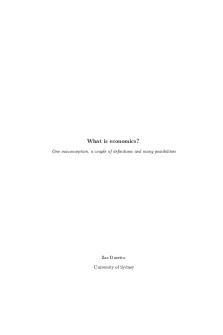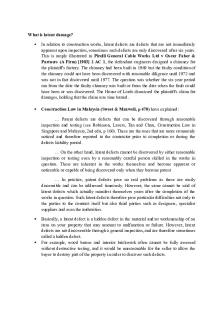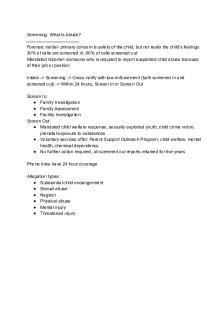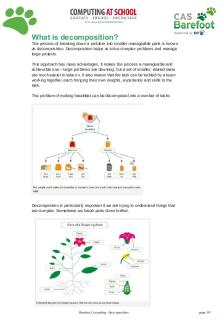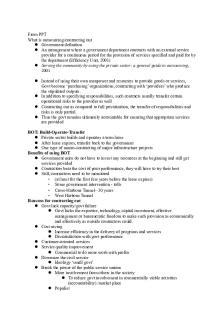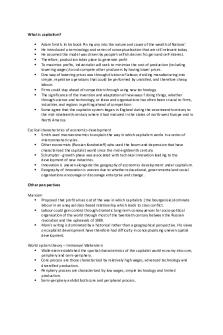What is economics - Lecture notes general PDF

| Title | What is economics - Lecture notes general |
|---|---|
| Author | Jinni Cheah |
| Course | Introductory Microeconomics |
| Institution | University of Sydney |
| Pages | 6 |
| File Size | 78.1 KB |
| File Type | |
| Total Downloads | 81 |
| Total Views | 133 |
Summary
simple notes that was provided...
Description
What is economics? One misconception, a couple of definitions and many possibilities
Zac Duretto University of Sydney
1
A motivational misconception
Here is the stand-alone question that is almost entirely responsible for me wanting to make this document: economics is all about money, isn’t it? Some people think economic analysis is purely concerned with financial profit and making as much money as possible. To answer the question swiftly: no. Do I understand why this misconception exists? Of course. What are some of the most common economic concepts discussed almost everyday? GDP growth, inflation, unemployment, exchange rates, etc. All of these can be loosely related to money or may have a dollar figure attached to them. This results in many media representations of economics focusing on the financial aspects of the particular project or story. In addition, prices are useful in measuring value as well as analysing market structures and the behaviour of market participants. It is certainly true that economics can involve money (in particular, prices), however there is much more to the discipline than what most people are aware of. This short document attempts to rectify the misconception that economics is all about money, in doing so presenting the wide scope that economics has as well as strange and intriguing areas where economics unexpectedly falls into the picture.
2
Textbook definitions - let’s start there
“Economics is the study of choice under scarcity... key questions that an economy needs to ‘decide’ are: (a) what to produce; (b) how to produce it; and (c) who should get what is made.” 1 “Historically, experts have wrestled with one fundamental issue above all else: how to solve what we call the economic problem. That is, how can a society satisfy the unlimited wants (of the individual or the community) with the limited resources availble?” 2 From such definitions a perfectly reasonable conclusion can be reached: economics is broad. Economics is not restricted to looking at changes in GDP or making as much money as possible. Economics is fundamentally a social science that analyses the decision-making of economic agents. These agents don’t have to be multinational corporations; it could be one person deciding on their lifetime consumption strategy, or a sea of school applicants choosing where to study in the future, or a government deciding which areas of healthcare should be prioritised. Economics (in particular, econometrics) is also thoroughly concerned with how one variable influences another. Once again, there is no limitation (beyond data access) as to what these variables could be. They could be education and income (thus being ‘about money’) or they could be air pollution and respiratory illnesses. My point here is that economics can come into so many different areas, and I certainly don’t have the knowledge to tell you all of them. My time studying economics so far has drastically widened my understanding of where economic principles and concepts can be 1
Nguyen, B. & Wait, A. (2015). Essential of Microeconomics. First Edition, Routledge. NOTE: this is the ECON1001 textbook. 2 Dixon, T. & O’Mahony, J. (2020). The Market Economy: Year 11 Preliminary Economics. 2020 Edition, Pearson.
1
applied. This leads me to providing just a small taste of the diverse ways in which economics can appear in the real world, and what kind of things you can look forward to when studying an economics degree.
3
A broad and fascinating social science
In order to provide a demonstration of the diverse applicability of economics, an interesting, wide-ranging and frankly odd list seemed appropriate. The questions below all relate (in some way or another) to economics; each with a relevant reference to either a specific economics course or a published economics paper (or both). With such questions in mind, I hope you become as fascinated by economics as I am. • How do individuals fundamentally make decisions? [1] • What is the impact of longer hospital stays on the health of a newborn baby? [2] • How can we allocate thousands of students to a handful of schools while making the students as happy as possible? [3] • Why do golfers putt better for par then when going for a birdie? [4] • Why does the government get involved in health insurance markets? [5] • How can I find a causal relationship between two variables using observational data and not a controlled experiment? [6] • How can we incentivise businesses to reduce their pollution? [7] • How does press freedom and democracy affect corruption? [8] • How do economic agents act strategically? How can strategic thinking relate to prisoners turning on each other? [9] • How does moving out of disadvantaged neighbourhoods impact employment, crime and high school dropout rates? [10] • How can I use a sample to understand something about the entire population? [11] • What makes Facebook and Google such heavyweights in digital platforms? [12] • What are recent trends in inequality and why? [13] • What is the impact of juvenile incarceration on high school completion rates and recidivism? [14] • Why aren’t people rational? [15] • Do fair wages encourage higher productivity? [16] • How can we attempt to value clean air? [17] 2
• How can we forecast variables and how can we know that one set of forecasts is better than another? [18] • How do people react to changes in the retirement age? [19] • What is the economics of climate change? [20] • How does the dismissal of a manager impact performance of a team with similar skills vs different skills? [21] • What biases do we have when making judgements? [22] • What is the major driver of business cycles? [23] • How much should I bid in the auction for my first house? [3] This list could easily be longer. Further, if we had another student with different interests to mine we would be dealing with an entirely different list, still sitting comfortably under the (not so dry) umbrella of economics. I hope this has helped you understand how wide the scope of economics is. For those studying economics, enjoy.
3
References [1] Intermediate Microeconomics (ECOS2001); Intermediate Microeconomics Honours (ECOS2901). [2] Almond, D. & Doyle, J. (2011). After Midnight: A Regression Discontinuity Design in Length of Postpartum Hospital Stays. American Economic Journal: Economic Policy, 3, 1-34. Studied in ECOS3903. [3] Advanced Microeconomic Honours (ECOS3901). [4] Pope, D. & Schweitzer, M. (2011). Is Tiger Woods Loss Averse? Persistent Bias in the Face of Experience, Competition, and High Stakes. America Economic Review, 101 (1), 129-157. [5] Public Finance (ECOS3011). [6] Applied Microeconometrics (ECOS3903); discussed in some econometrics subjects (e.g. ECMT2150). [7] Environmental Economics (ECOS3013). [8] Development Economics (ECOS3002). [9] Strategy is a central component of game theory, which is discussed in microeconomics classes (ECON1001, ECOS2001, ECOS2901, ECOS3901). NOTE: the second question refers to the famous game threory example known as the Prisoner’s Dilemma. [10] Chyn, E. (2018). Moved to Opportunity: The Long-Run Effects of Public Housing Demolition on Children. American Economic Review, 108 (10), 3028-3056. Studied in ECOS3903. [11] This is a central component to many econometrics classes (e.g. ECMT1020, ECMT2150, ECMT3160). [12] Brousseau, E. & Penard, T. (2007). The Economics of Digital Business Models: A Framework for Analyzing the Economics of Platforms. Review of Network Economics, 6 (2), 81-114. [13] Labour Economics (ECOS3008). [14] Aizer, A. & Doyle, J. (2015). Juvenile Incarceration, Human Capital and Future Crime: Evidence from Randomly Assigned Judges. Quarterly Journal of Economics, 759-804. Studied in ECOS3903. [15] Experimental and Behavioural Economics (ECOS3016). 4
[16] Cohn, A., Fehr, E. & Goette, L. (2015). Fair Wages and Effort Provision: Combining Evidence from a Choice Experiment and a Field Experiment. Management Science, 61 (8), 1777-1794. Studied in ECOS3016 and ECOS3008. [17] Ito, K. & Zhang, S. (2016). Willingness to Pay for Clean Air: Evidence from Air Purifier Markets in China. NBER Working Paper No. 22367. Studied in ECOS3013. [18] Forecasting for Economics and Business (ECMT3130). [19] Atalay, K. & Barret, K. (2015). The Impact of Age Pension Eligibility Age on Retirement and Program Dependence: Evidence from an Australian Experiement. The Review of Economics and Statistics, 97 (1), 71-87. Studied in ECOS3011. [20] Stern, N. (2006). The Economics of Climate Change: The Stern Review. United Kingdom: Cambridge University Press. Studied in ECOS3013. [21] Personnel Economics (ECOS3023). [22] Tversky, A. & Kahnemen, D. (1974). Judgement under Uncertainty: Heuristics and Biases. Science, 185 (4157), 1124-1131. Studied in ECOS3016. [23] Advanced Macroeconomics Honours (ECOS3902).
5...
Similar Free PDFs

Ch. 1 - What is Economics
- 3 Pages
Popular Institutions
- Tinajero National High School - Annex
- Politeknik Caltex Riau
- Yokohama City University
- SGT University
- University of Al-Qadisiyah
- Divine Word College of Vigan
- Techniek College Rotterdam
- Universidade de Santiago
- Universiti Teknologi MARA Cawangan Johor Kampus Pasir Gudang
- Poltekkes Kemenkes Yogyakarta
- Baguio City National High School
- Colegio san marcos
- preparatoria uno
- Centro de Bachillerato Tecnológico Industrial y de Servicios No. 107
- Dalian Maritime University
- Quang Trung Secondary School
- Colegio Tecnológico en Informática
- Corporación Regional de Educación Superior
- Grupo CEDVA
- Dar Al Uloom University
- Centro de Estudios Preuniversitarios de la Universidad Nacional de Ingeniería
- 上智大学
- Aakash International School, Nuna Majara
- San Felipe Neri Catholic School
- Kang Chiao International School - New Taipei City
- Misamis Occidental National High School
- Institución Educativa Escuela Normal Juan Ladrilleros
- Kolehiyo ng Pantukan
- Batanes State College
- Instituto Continental
- Sekolah Menengah Kejuruan Kesehatan Kaltara (Tarakan)
- Colegio de La Inmaculada Concepcion - Cebu
